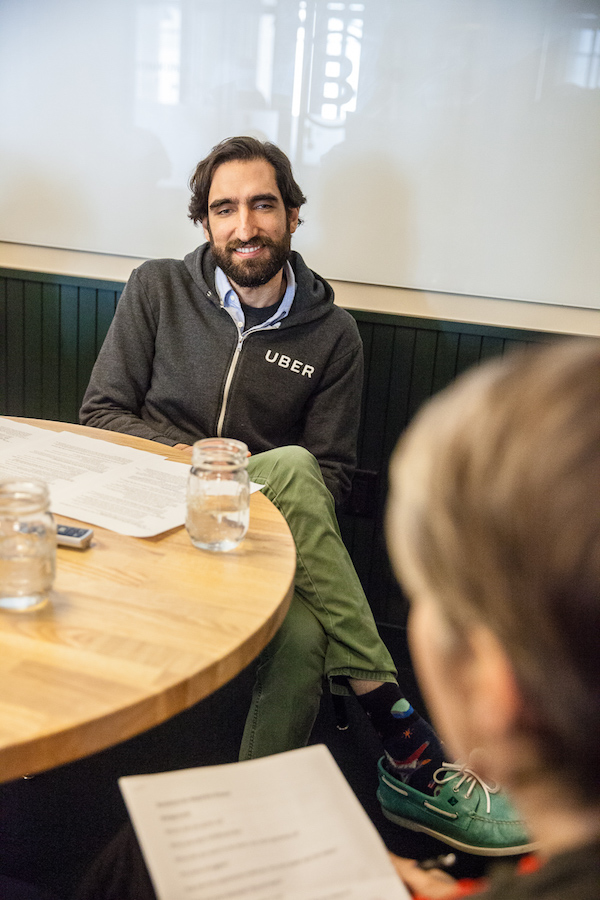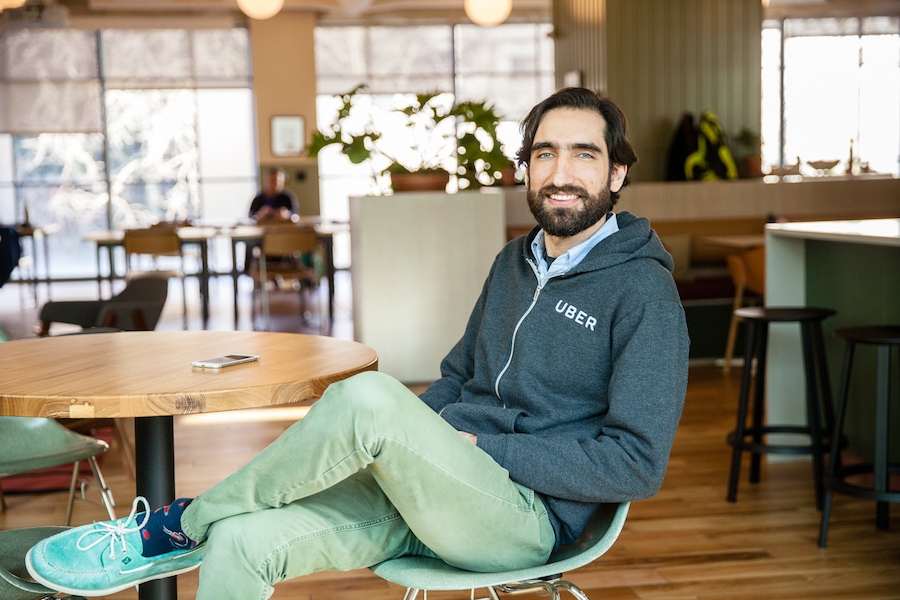Alejandro Chouza is charged with repairing relationships with regulators as the ride-sharing company expands in Oregon.
The day before Alejandro Chouza left Seattle in 2014 to start a new job as a general manager for Uber Technologies in Tijuana, Mexico, he went on a first date with his future wife.
It was perhaps not the greatest timing to start a relationship the day before beginning a job in another country. But they stuck with it, and late last year Chouza was reunited in Seattle with his wife and two-month old baby son, after starting a new role as general manager for Uber in the Pacific Northwest.
New job. New baby. It is a lot of change. But it also marks a period of stability personally for Chouza, who is grateful he is no longer in a long-distance relationship.
You could argue that Uber has also entered a phase of stability after new CEO Dara Khosrowshahi took the helm in August 2017. The former CEO of Expedia replaced the infamous former head of the ride-sharing company, Travis Kalanick, whose aggressive leadership style did untold damage to the company’s reputation.
Chouza’s friendly, non-combative persona is at odds with former management tactics that were followed under Kalanick’s leadership. Khosrowshahi has set a more transparent, conciliatory tone, and it is Chouza’s job to replicate that at the local level.
“Dara brings a lot of stability,” said Chouza, who sat down to chat at Uber’s Portland offices in the WeWork shared office space at Pioneer Place mall. The ride-sharing company is on a big PR push, and the new general manager is part of the public relations campaign.
“He is very humble. He admits to mistakes of the past. He says he can’t control the past but can commit to learning from those mistakes and focusing on the future. Since I started in December, I have taken on that approach.”
The new general manager certainly has his work cut out to build trust among regulators in the Pacific Northwest. Oregon and Washington are two of only four states (the others are Vermont and Hawaii) that do not have state-wide ridesharing regulations allowing Uber drivers to transport riders anywhere in the state. The ride-services company has approval to operate in Portland, Bend, Salem, Corvallis and Medford.
SEE RELATED STORY: SALEM EXPERIMENTS WITH AN ON-DEMAND BUS
Uber damaged relationships with city officials when it started operating in Portland in 2014. It didn’t have permits at the time, and used a software it created called Greyball to help drivers evade regulators who tried to book rides. It wasn’t until a year later that it received approval to operate in the city.
Chouza has met regulators to discuss the future strategy of the company. With city officials he wants to be open and transparent about past mistakes. “I want the relationship to be more collaborative. I understand trust doesn’t come in one meeting. It is easy for someone to come in and say we are going in a new direction and blindly trust me. But the only way we can demonstrate that is through consistent action.”
Chouza grew up mostly in Mexico City in a large family of three sisters and several uncles and cousins. His grandparents moved to Mexico from Lebanon. As a child he moved around quite a bit between San Diego and Mexico City for his father’s work. “Change was pretty constant, moving schools, cities,” he said.
He went to college in the U.S. and returned to Mexico for stints as an entrepreneur in pharmaceutical manufacturing and online advertising. Chouza returned to the U.S. to pursue an MBA before moving to Seattle in 2010 to work for Microsoft.
“In my previous jobs, I wasn’t really excited about the mission – the impact I was having on the world,” he said of his decision to start a career at the ride-sharing company. It was the impact that Uber could have on improving transportation options, especially in developing countries, that attracted him to working for the start-up.
“For me growing up in Mexico [safe public transportation] wasn’t a thing. I remember none of the taxis had seat belts. Mexico City has one of the highest numbers of taxis- there are 150,000 and 50,000 of those are illegal and have no permits,” says Chouza.
It should be noted Uber did not have any permits when it initially came to Portland, and its drivers operated illegally until it got approval from the city the following year.

While working for Uber in Mexico, Chouza expanded the company’s presence in 20 cities in the northwest of the country. It was a time of rapid growth for the company under the leadership of Kalanick. When Chouza joined there were 1,200 employees. There are 17,000 today and the service operates in 40 Mexican cities.
That rapid growth created challenges for those in charge. “I remember before there were no customer service representatives because we were growing that part of the organization. We would get thousands of emails from riders or drivers every day – whether it was the general manager or the operations manager, that is what we did all weekend.”
Despite Kalanick’s reputation for hard-nosed leadership, Chouza has good words to say about the former CEO. “He was very smart, very engineering focused. He has a dream about transportation and how to improve our cities.”
With the new CEO Khosrowshahi in charge, Chouza says there is lot of positivity at the firm. The new leader has put in place eight new “cultural norms,” including celebrating differences and being “customer obsessed.”
As part of the company restructuring, Khosrowshahi consolidated the number of regional general managers Uber had in the U.S. from 40 into six, with the aim of keeping more control over management at the local level. Chouza oversees around 30 rides business employees in six states – Oregon, Washington, Montana, Idaho, Wyoming and Alaska.
Portland is a significant market for Uber with more than 7,000 active drivers. In Oregon overall, there are 8,000 active Uber drivers and 385,000 active riders. The company does not provide numbers on growth in users.
Although Uber is pushing for state-wide regulation in Oregon, it does not have plans to seek a bill this session, said Jon Issacs, public affairs manager for Uber in the Pacific Northwest.
Among the initiatives Chouza is pursuing in Oregon is getting uberPOOL up and running in Portland. The service, which launched in the city in December, allows drivers to pick up and drop off multiple riders going in the same direction. The general manager said this helps reduce the number of vehicles on the road and cost for drivers. “It is part of our goal to make our cities more functional,” he said.
Uber and other ride sharing companies have been criticized for cannibalizing mass transit. The city of Chicago recently imposed a first of its kind ridesharing fee to help shore up its public transit system. Uber spokesperson Nathan Hambley said the company would have to review the specifics of any proposal to pass a similar fee in Portland.
SEE RELATED STORY: IS OUR OBSESSION WITH EFFICIENCY SLOWING US DOWN?
The company is also working with TriMet to allow riders to book Uber rides when planning a trip through the transportation agency’s trip planner software. It would be the first place in the country to have such functionality.
On the broader level, Uber is talking with legislators in Washington state about creating a “portable benefits system” that would give gig economy workers access to benefits, such as healthcare and retirement. This initiative would benefit Uber drivers who do not have access to the company’s employee benefits package because they are considered independent contractors.
Talks with Washington regulators are in the early stage. The company hopes to convene stakeholders, including labor groups, to discuss a legislative package for the 2019 session. Uber has reached out to labor groups in Oregon to let them know it is interested in a similar policy here.
The tension between Uber and taxi cab companies is one area that is heating up, and could cause trouble for Uber’s PR push. Earlier this month the suicide of a New York City livery driver, who complained on his Facebook page before he shot himself that ride-sharing companies are forcing professional drivers out of business, garnered a lot of media attention.
Chouza was speechless when asked to respond to the accusations that the company is destroying the livelihoods of cab drivers. Eventually he touted the large numbers of drivers that work for Uber in Portland and their flexible work schedule as benefits for working for the company.
Reputation is everything for tech companies like Uber, which rely on consumer use of mobile apps to stay in business. Uber found out how damaging a poor reputation can be last year after a #DeleteUber hashtag trended on Twitter. The backlash started after Uber drivers continued to pick up riders at John F. Kennedy airport in New York despite a strike by a local taxi cab group protesting President Trump’s travel ban on Muslims from certain countries.
As Chouza works to repair damaged relationships with regulators and promote an inclusive workplace culture, the external image of the company is on his mind.
Asked what keeps him up at night, he responded: “What could worry me is that all the great work and impact we have on cities is not seen from the outside. The impact we have relative to the external image of the company is not aligned in certain ways.”





